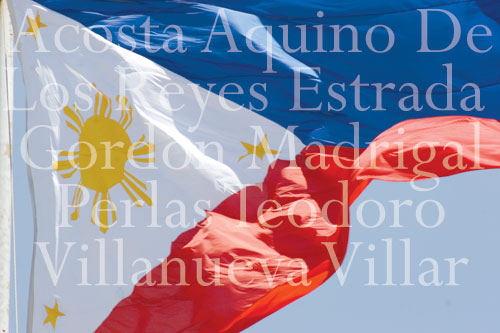
he names of the the 2010 Presidential candidates.
The names of the the 2010 Presidential candidates.
Filipino expats, migrant workers, dual citizens and holders of temporary or permanent resident visas can vote in the 2010 elections provided they are registered OAVs – overseas absentee voters.
Registered OAVs have until 6:00 p.m. on 10 May, Manila time (8:00 p.m. AEST) to vote. The Philippine Consulate website in Sydney (www.philippineconsulate.com.au) has a detailed guide on how to fill out a COMELEC ballot and send it to the Consulate.
How you cast your vote differs among the various Philippine embassies and consulates. For example, the Philippine Consulate in Sydney accepts votes by mail while other Philippine foreign missions require voters to do so in person. It’s best to contact the Philippine embassy or consulate in your state or country to find out how you can vote.
For more information, the Commission on Elections website, www.comelec.gov.ph has a section for OAVs. All online Philippines news media also feature daily news about the electoral campaigns alongside other websites such as www.politicalarena.com and www.mggphils.wordpress.com for the Movement for Good Governance.
You’ve already missed out on the 2010 elections if you haven’t registered by now, even if you’re eligible to vote. Those already registered as an OAV don’t have to register again. However, if you haven’t voted for two consecutive elections or moved country or state of address, you must register again with your new details.
To participate in the next elections, go to the Philippine Embassy or Consulate during the period of registration, which is likely from February to August 2012 (or the year before the 2013 elections).
Did you know?
According to the Philippines’ Commission on Elections (COMELEC), there are more than 150,000 OAVs around the world, including more than 1,200 from Australia and New Zealand. That’s a small number given the Philippines’ population is more than 92 million and around 11 million are reported to be living overseas. So if you know Filipinos who are eligible to vote, encourage them to become a registered OAV.
In the running
Just as America’s youth turned up in force to support US president Barack Obama during his presidential campaign, earlier reports suggest young Filipinos will have the ‘swing vote’ in this year’s elections as 40 per cent of voters are 18 to 35 and they represent a potential three million first-time voters, according to data quoted by political blog, The Diplomat (www.the-diplomat.com).
But according to the April 2010 Pre-Election national survey by Pulse Asia (www.pulseasia.com.ph), presidential candidate Senator Benigno ‘Noynoy’ Aquino III is leading the polls with four in 10 Filipino registered voters (39 per cent) showing their support.
Tied for second place with an overall voter preference of 20 per cent are former President Joseph Estrada Ejercito and Senator Manuel B. Villar, Jr.
The other presidential candidates including JC De Los Reyes, Dick Gordon and Eddie Villanueva have the support of at most 7 per cent of registered voters.
While the focus has largely been on the presidential hopefuls, the 2010 elections is about deciding on the country’s next government with 17,000 national and local positions to be filled. It is going to be a tight contest with more than 85,000 candidates for these positions.
How to be a dual citizen
If you’re an Australian citizen, the upcoming elections may be a good time to consider taking up a dual citizenship. A natural-born Filipino who gave up their citizenship in the Philippines to become naturalised in another country can apply for dual citizenship and become Filipino by nationality again.
You must provide your original Philippine birth certificate, an old Philippine passport, certificate of Australian citizenship, current Australian passport, and (if the applicant is married) their marriage certificate. For more information, check out www.philippineconsulate.com.au or you can go through the Bureau of Immigration of the Philippines on www.immigration.gov.ph
Special Thanks: The Australian Filipina thanks the Philippine Consulate in Sydney for their assistance on the election articles.